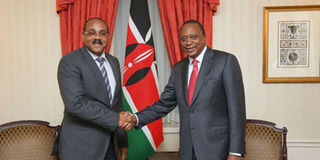Fact-checking could help weed out the inaccuracies that pollute journalism

President Uhuru Kenyatta (right) holds bilateral talks with the Prime Minister of Antigua and Barbuda Gaston Browne on the sidelines of the 70th Session of the United Nations General Assembly in New York. When President Kenyatta said the public wage bill is 52 per cent of government expenditure and later opposition leader Raila Odinga said it is 33 per cent. Who is lying? PHOTO | PSCU
What you need to know:
- Nonetheless, it shows just how easy it is for newsmakers to make false or misleading statements in the media without being corrected. We have seen that in recent days and weeks.
- The problem of uncorrected errors persists because the media in this country does not employ dedicated fact checkers.
- It would benefit listeners and readers because they would be more astute in judging and understanding statements.
Just what is the real age of Kenya’s first “Iron Lady of politics” and woman mayor? That is the question that comes to mind after reading the September 27 Sunday Nation interview of Grace Onyango. Here are the relevant extracts from the interview by Angela Oketch, published on page 13 of the Lifestyle magazine:
Oketch: At what age did you join politics?
Onyango: I was 37 years.
Oketch: For how long were you in politics?
Onyango: I joined in 1964 and left in 1983….
Oketch: How old are you?
Onyango: I am 70 years old.
As soon as the paper hit the streets, eagle-eyed Kimathi Mwirichia shot off an e-mail to Ms Oketch. “The assertion is clearly not factual and you should have got clarification from the interviewee or corrected the same in the story,” he said. “She is now 88 years based on the available information.”
Mr Mwirichia said the editor, as the gatekeeper and watchdog, should have seen the error and corrected it. Truly, had the interview been carried out and published in 1997, there would have been no maths issue.
A paper, “Drawing from the Wells of Culture: Grace Onyango and the Kenyan Political Scene (1964-1983)”, by Phoebe Musandu, published in 2008, states that the teacher-turned-politician was born in 1927.
UNCORRECTED ERRORS
The erroneous reporting of Ms Onyango’s age, however, is not an important subject for public concern. It would be a big issue if, for example, she was running for the presidency or being posted to Beijing as Kenya’s ambassador.
Nonetheless, it shows just how easy it is for newsmakers to make false or misleading statements in the media without being corrected. We have seen that in recent days and weeks.
For example, when President Uhuru Kenyatta said the public wage bill is 52 per cent of government expenditure and later opposition leader Raila Odinga said it is 33 per cent. Who is lying?
If you read my column last Friday, “Errors that would have gone unnoticed but for the vigilance of eagle-eyed readers”, which appeared only in the on-line Nation (http://www.nation.co.ke/oped/Opinion/-Errors-that-would-have-gone-unnoticed/-/440808/2884456/-/y7hf7p/-/index.html) because the printed Daily Nation dropped pages 13, 14, 55 and 56 due to a technical problem, you will appreciate how big the problem of uncorrected errors, big and small, is.
POLLUTING JOURNALISM
The article pointed out a front-page story by the Sunday Nation of June 14, which said Pope Paul II visited Kenya in 1990. The correct year was 1985. Macharia Gaitho, in his commentary headlined “Real value of ‘madaraka’ is not the numbers; it’s the society we build”, published in the Daily Nation of June 2, stated the speech President Uhuru Kenyatta read on Madaraka Day was 4,700 words long. Actually, it was about 3,700 words.
The problem of uncorrected errors persists because the media in this country does not employ dedicated fact checkers.
False or misleading information is commonly passed on to the public and politicians and other public figures are let to freely pollute journalism and endanger free speech with falsehoods, untruths, half-truths, mis-statements, and distortions.
Obviously, not every assertion is verifiable or checkable, especially when it falls under the realm of opinion, but the media can check some of the more blatantly misleading and outrageous claims.
PROOF READING
The media can check the facts by employing, not just journalists who report what they are told, but those who can also check out what they are told. Fact-checking is a practice in journalism going back to the 1930s in the United States.
The New York Times, for example, has a dedicated fact-checking department. The practice has spread to news organisations in other countries.
Fact-checking is a form of accountability in journalism that would benefit everybody. It would benefit politicians by making them more careful and honest in what they say because they would know that their assertions will be checked for correctness.
It would benefit listeners and readers because they would be more astute in judging and understanding statements. All that would contribute to an earnest and intelligent public discourse.





